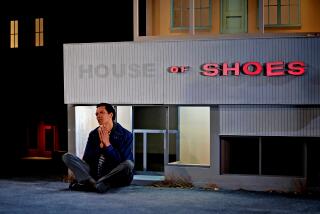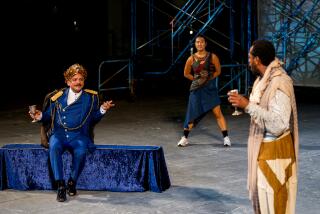On the London stage, ‘The Lehman Trilogy’ and ‘Allelujah!’ chronicle worlds warped by money
Reporting from London — Beyond being two of the most anticipated new dramas in London this summer, Ben Power’s English adaptation of Italian playwright Stefano Massini’s “The Lehman Trilogy” at the National Theatre and Alan Bennett’s “Allelujah!” at the Bridge Theatre wouldn’t seem to have much in common. Stylistically, they’re as different as chalk and cheese.
But both plays track the way money can insidiously corrupt the soul of a nation. Irony may have worn down our capacity for high tragedy, but capitalism run amok is a recipe for good old-fashioned catastrophe. These tales about a storied New York financial services firm grown too big and byzantine for its own good and a cradle-to-grave community hospital in Yorkshire endangered by privatization reveal the chaos that occurs when values are dictated by balance sheets.
Directed by two of the leading British directors, Sam Mendes’ production of “The Lehman Trilogy” and Nicholas Hytner’s production of “Allelujah!” share another trait: Neither follows the standard conventions of playwriting. Massini spins drama from oral history like the Homer of investment banking, and Bennett, reworking the model for his Tony-winning drama, “The History Boys,” offers a mixed salad of comedy, melodrama, stinging political critique and offbeat musical interludes that only he would have the blasé temerity to toss together.
This English version of “The Lehman Trilogy,” which is likely bound for New York after a string of raves, is a condensed version of Massini’s five-hour epic that made a splash in Paris and Milan. Divided into three acts, each running approximately an hour, Power’s efficient adaptation receives a sleek Mendes staging that has full faith in the spell of this uniquely American story and the three brilliant actors (Simon Russell Beale, Ben Miles and Adam Godley) who incant it.
This is an origins tale that harks back to the founding of Lehman Brothers as a dry goods store in Alabama by Henry Lehman (Beale), an immigrant of Bavarian Jewish heritage who arrived from Germany in 1844 and was joined in succession by his brothers Emanuel (Miles) and Mayer (Godley). Henry was considered the head, Emanuel the arm and Mayer, who was the moderating influence between them, was affectionately nicknamed the potato. Each played an indispensable role in the journey from simple merchants of suits and fabrics to powerful middlemen (the fancy word is brokers) buying and reselling raw cotton.
The actors are dressed in dark 19th-century attire designed by Katrina Lindsay, but Es Devlin’s rotating glass box set never lets us lose sight of the harsh fate meted out in 2008 to a company that many wrongly assumed was too big to fail. (The bankruptcy, a pivotal moment in the Great Recession, is glimpsed at the top of the show.) How the small family business grew to become a banking colossus is a fascinating saga of American capitalism as it moves from 19th-century innocence to 21st-century decadence.
A piano player accompanies the unfolding chronicle, providing a romantic underscore for the tumble of words, most of which are spoken directly to the audience. Dialogue occurs, but telling triumphs over showing.
Other characters come into sharp focus after Henry, Emanuel and Mayer die or fade into the background. Beale, up for any challenge, also plays Philip, the genius son of Emanuel who branches the business into the railroads. Miles assumes the part of Henry, the Lehman who chose politics over banking. Godley’s roles include Bobby, Philip’s art-loving, Yale-educated son, who steered the firm through the shoals of the Great Depression. The protean cast is faultless. But the figures become blurrier as the story progresses and the sheer proliferation of characters makes it difficult at times to sort out who is meant to be speaking.
How a small business grew to a banking colossus is a fascinating saga of American capitalism as it moves from 19th-century innocence to 21st-century decadence.
The true protagonist of “The Lehman Trilogy” isn’t a specific family member but American capitalism itself. It’s this larger story of how a nation’s unparalleled economic promise, which allowed immigrants with nothing but industriousness and a talent for shrewd risk-taking to become titans of wealth, was perverted as new innovations and strategies were constantly needed to keep the dream of extraordinary prosperity alive.
Speaking of dreams, the production stages (with help from Luke Halls’ video design) the terrifying visions that wake various members of the Lehman family in the middle of the night. The general theme is that the higher one climbs, the more trepidation there is about falling, yet to stop climbing poses its own hazards — a metaphor for capitalism that leads inevitably to the Great Recession.
The final third of “The Lehman Trilogy” is the least satisfying. The chronology is fuzzy, the characters are less individualized and the bankruptcy comes almost as an afterthought. Perhaps the loss is the result of Power’s reduction, but Massini’s play seems too simplistic in tracing the rise of a family fortune and too hurriedly complicated in the unraveling of what had been built.
Henry, Emanuel and Mayer are viewed more or less uncritically. The business practices that established the company’s foundation are viewed as a series of triumphs. Surely, there’s more to a success story that had its roots in the slave-reliant South and depended on a fire that wiped Montgomery’s cotton plantations out. (The Lehmans had a knack for making the most of other people’s disasters.)
The expansion by Philip into new arenas is cheered along more nervously, but the play’s giddy approval of the family’s moneymaking prowess rarely wavers. When Bobby invites in the computer guys with their high-octane trading, the dance grows manic — literally, as this chapter has elderly Bobby doing the twist as the company accelerates in ways that Henry could never have imagined. Something diabolic has been unleashed. But the Lehman family isn’t scrutinized. It’s the system that is seen to have gone out of control.
Morality tales need moral actors (of the good and bad variety), and the play doesn’t make sufficient room for Pete Peterson and Lewis Glucksman, two crucial figures in the Lehman Brothers’ later history described in opposition as “the perfect banker” and “a ruthless trader.” “The Lehman Trilogy” is at its most engaging at the birth of the family enterprise, when the head, the arm and the potato synergized their distinctive personalities into a winning formula.
As the 21st-century incarnation of the company is being packed up at the end, it’s to the Alabama store that the play returns. Henry eulogizes the lost age: “Before the markets and the chaos / the fire and the flood. / When there was nothing / but three brothers / standing together in the morning sun / dreaming of America.” But though the play would rather romanticize the period when a fortune was cleverly amassed out of thin air, it’s here where the seeds of destruction were planted.
The setting for Bennett’s “Allelujah!” is the geriatric ward of the Bethlehem, a community hospital whose days are numbered. A documentary film is being made in conjunction with the campaign to “Save the Beth!” But tightening National Health Service budgets make that unlikely, leaving the elderly residents to an uncertain fate.
Hospital closures are as pressing a problem in the U.S. as they are in Britain, but theater economics in America would make this wobbly, large-cast play a challenging prospect for transfer. The extensive character list, which includes a doctor whose immigration status is unsettled, a brusque government consultant whose father is a patient, a hospital chairman who can’t resist a photo op or a hackneyed sound bite, a jaded nurse with a violent antipathy to bed-wetting and a cadre of old people who are by turns adorable and exasperating, hints at the problem of dramatic overcrowding.
Bennett, the reigning master of miscellany, has created competing story lines in an effort to structure a play that can’t quite duplicate “The History Boys” magic. There’s charm in some of the sprawl, and the inclusion of dance numbers (“A, You’re Adorable,” “Love and Marriage,” “Good Golly, Miss Molly,” among them), which have the arthritic and the senile momentarily recovering their vibrancy, is utterly delightful.
This dark hospital comedy is a kind of state-of-the-nation revue by a dramatist who, at 84, is clearly outraged by Britain’s slide into neo-Thatcherism.
The plot, however, grows increasingly contrived. A nurse on the ward, Sister Gilchrist (a waste of the remarkable Deborah Findlay), is conscripted to ratchet up the drama with her clandestine solution to the problem of no open beds. And this is only one of several soap opera-ish surprises.
Hytner has a remarkable collaborative history with Bennett (“The History Boys,” “The Lady in the Van,” “The Habit of Art,” among other productions). But a play doctor is needed to fix this dark hospital comedy, which is a kind of state-of-the-nation revue by a dramatist who, at 84, is clearly outraged by Britain’s slide into neo-Thatcherism.
Colin (Samuel Barnett, a memorable “History Boys” alum), the management consultant who has the health minister’s ear, speaks the new version of the old conservatism: “The notion of a hospital catering for a community from birth to death is a sentimental one. It’s the stuff of television. We do not need these birth-to-death emporiums.”
Austerity has once again dried up empathy. Dr. Valentine (an appealing Sacha Dhawan, who was also in “The History Boys”) is warned by Salter (Peter Forbes), his ever-political hospital chairman, not to be so demonstratively caring with the patients: “Just endeavor to be more detached. A whisker less affectionate. More … unfeeling. In a word, more professional.”
Bennett’s anger is always at its most tonic when converted into witty Bennettisms. When one hospital resident ruefully muses that “Heaven’ll be the same as Heathrow. There’ll be a VIP lounge,” the economic lunacy of our age is skewered with droll éclat.
“The Lehman Trilogy” and “Allelujah!” are still working out their kinks, but together they tell a tale of unhinged modern capitalism and its worsening discontents.
Follow me @charlesmcnulty
More to Read
The biggest entertainment stories
Get our big stories about Hollywood, film, television, music, arts, culture and more right in your inbox as soon as they publish.
You may occasionally receive promotional content from the Los Angeles Times.











